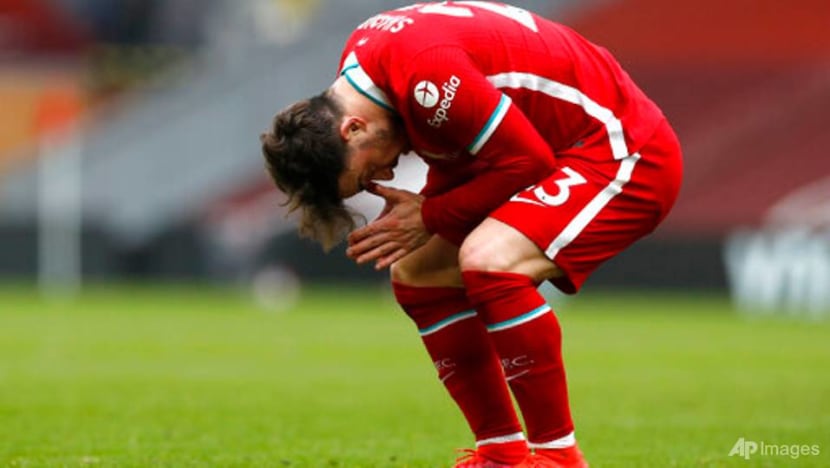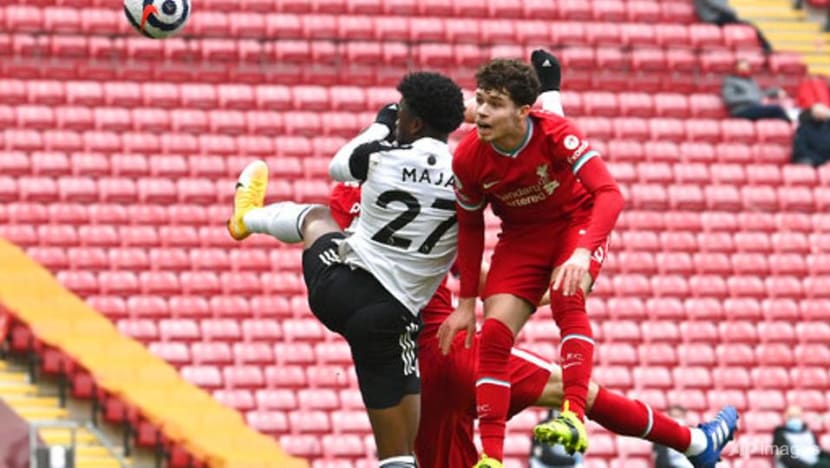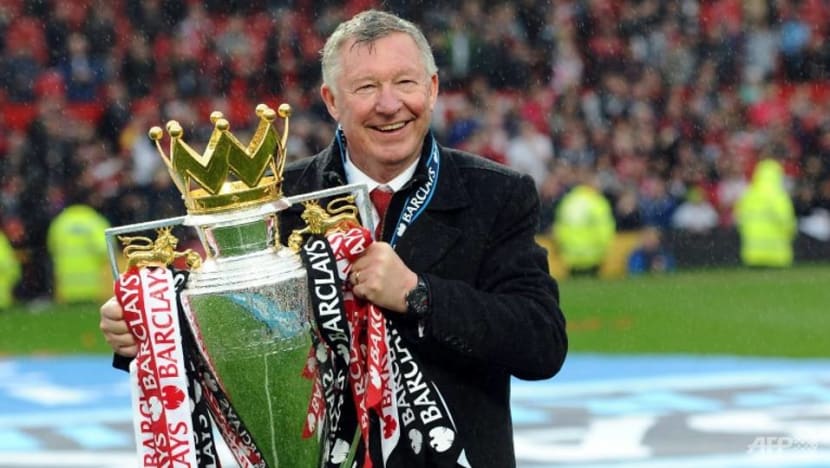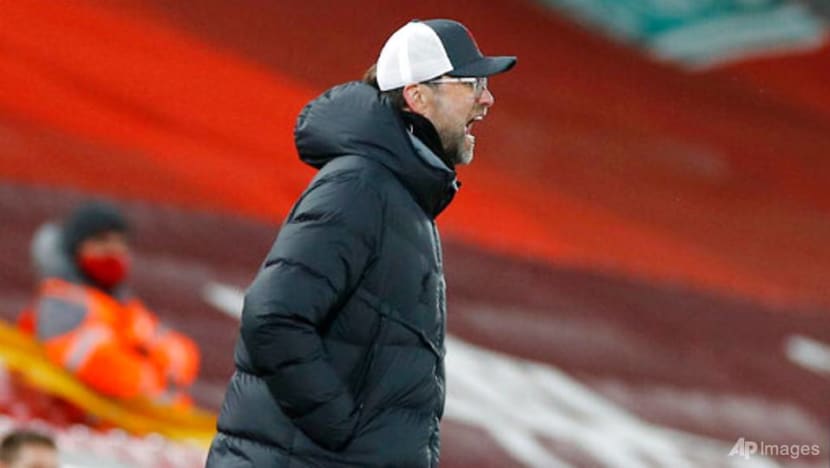commentary Commentary
Commentary: After three years of success, is Liverpool’s decline inevitable?
There are multiple reasons for Liverpool’s recent poor form, but some changes could help rejuvenate the club, says John Duerden.

Liverpool's Xherdan Shaqiri reacts after missing a scoring chance during the English Premier League soccer match between Liverpool and Fulham at Anfield stadium in Liverpool, England, Sunday, March 7, 2021. (Phil Noble/Pool via AP)
SINGAPORE: On Jan 8, Liverpool was on top of the English Premier League and looking good for a second successive title. Yet, after Sunday’s (Mar 7) 1-0 loss to Fulham – its sixth home defeat in a row - the champions were sitting 22 points behind leaders Manchester City.
In the previous two seasons, Liverpool lost a total of four league games but, incredibly the Reds, so dominant in winning the 2019 to 2020 title, lost the same amount in February alone.
Head coach Jurgen Klopp admitted that the title is now out of his team’s reach thanks to the dip in its form and a resurgent City. The worry now is that the six-time European champions will fail to finish in the top four and will miss out on qualification for the prestigious and lucrative UEFA Champions League next season.
READ: Commentary: Johor crown prince could take Valencia in the right direction
WHAT WENT WRONG?
Much has been said and written about long-term injuries to key players such as Virgil Van Dijk, Joe Gomez, Joel Matip, Diogo Jota and, most recently, captain Jordan Henderson.
Losing all three of their senior centrebacks has led to midfielders Fabinho and Henderson having to play as makeshift defenders.
The absence of Jota, who was on a scoring spree until he got sidelined, means that the star forward trio of Mohamed Salah, Sadio Mane and Roberto Firmino have had little rest in a hectic season.
It has been pointed out however that Liverpool fielded a strong line-up, even without Van Dijk, when losing 7-2 to Aston Villa in October, suggesting that there were already problems.
READ: Commentary: Liverpool will struggle to retain its title
Perhaps other teams have worked out how to play against Liverpool or that evidently, the absence of fans in stadiums is a bigger deal for the Reds given the febrile atmosphere that Anfield can create.
Even in their record-smashing victorious campaign last season, the Reds were a pale shadow of their invincible selves, when the EPL re-started after a six-week suspension due to COVID-19.

Without fans in the stadium after the restart, Liverpool won only five of their remaining nine games on the way to winning the title. In comparison, it had only drew and lost one game each in the 29 EPL matches before the suspension, when the fans were in attendance to back them up.
Further, Liverpool’s success has been built on a high-intensity pressing game developed by Klopp, one that is difficult to maintain in a schedule that has become more crowded due to the effects of COVID-19.
With the suspension last season, clubs have had to sandwich games into a tighter schedule this campaign as they race to finish the competition before players head off for national duties at the Euro 2021 tournament in the summer.
READ: Commentary: Spanish domination of European football is nearing its end
END OF THE CYCLE
Another leading television pundit and former Manchester United legend Gary Neville has also suggested that Liverpool are at the end of a natural three-year cycle.
The pattern seems to fit. Liverpool have been consistently excellent over the last three seasons – winning the UEFA Champions League and the EPL. Even when they finished second in the league behind City in 2019, the amazing 97 points they amassed was the third highest-total in EPL history.
After three years of success, Manchester City had a relatively quiet season last time around but have roared back and the same could be true for Liverpool.
READ: Commentary: The new era of English football belongs to Liverpool
“There is a chance of reset in the summer as that fourth year is always a challenge,” said Neville. “Man City needed that year off last year when Liverpool won the league comfortably and maybe this is what it is for Liverpool.”
Staying at the top longer than three years is rare – Everton in the 1980s and Arsenal shortly after are examples of teams that won two titles in a three-year period then faded.
Winning three titles in succession is even rarer. Manchester United did it twice – from 1998 to 2001 and from 2006 to 2009 – a period that saw it win 10 titles in 19 years.
FERGIE’S RECIPE
So how did the Red Devils do it for so long? Didn’t Neville’s “three-year peak” rule apply to his team then?

Manchester United’s then legendary manager Alex Ferguson ensured that the squad was constantly refreshed over a long period and employed a constantly changing roster.
David Beckham, who left Old Trafford in 2003 after 11 years, said that Ferguson’s success “was because he was always able to change”.
“He would always go out and buy a great new player the next year, or two great new players – even after winning the treble or the double, or winning the league.”
READ: Commentary: Could Sea Group’s Forrest Li be the next Singaporean owner of a global football club?
Famously, Ferguson released star players Paul Ince, Andrei Kanchelskis and Mark Hughes in the summer of 1995 and put his faith in youngsters such as Beckham and Neville who went on to provide the foundation for the second great team under the Scot.
Yet it is not just about the players. Chelsea and Manchester City have each spent large amounts of money building squads of world-class players but yet they have not replicated the long spell of success that United enjoyed under Ferguson.
The converse is also true. Clubs like Blackburn Rovers in 1995 and Leicester City in 2016, did not build upon their championship success and failed to invest when they were at the top and quickly fell back into the pack.
READ: Commentary: Love for the game? Is owning a football club worth the trouble?
REFRESHING THE CLUB
Ferguson also used his assistants to foster change and innovation. After long-time number two Brian Kidd left in 1999, the Scot turned to young English coach Steve McClaren, who introduced a new style of video analysis and expertise in player psychology, and then Portuguese coach Carlos Queiroz, whose tactical nous changed the way the team played, especially in Europe.
Ferguson was unusual in that he increasingly gave his assistants considerable autonomy in terms of training, tactics and even, on occasion, media work that not only refreshed the boss in terms of ideas and approach but reduced his workload.
One of the key accusations levied against Klopp is that Liverpool’s style is too predictable.

The German does like familiarity. He stuck with his trusted assistant Zeljko Buvac for 17 years spanning three clubs – a relationship which ended acrimoniously in 2018, due to a difference in opinions.
Despite a poor run of form, Klopp has stuck with the same formation and largely same set of players.
After winning the title last season, Klopp did introduce two new key players into the team – Jota from Wolves and Spanish midfielder Thiago Alcantara from Bayern Munich.
Perhaps that was not enough especially since injuries have left the team without much cover in defence and their attack lacks a creative spark.
READ: Commentary: It is time social media played a more important role for football clubs
But any new player additions can only come in the summer now so working with his coaching team to introduce new tactical changes could be the spark needed to rejuvenate Liverpool’s season.
All is not lost as shaking things up on the pitch may give Liverpool a spark of life. The title is pretty much out of grasp but a top four finish is still mathematically possible.
The Reds are also still in the UEFA Champions League and winning it count as a success for the club and its supporters.
But even if that happens, Liverpool have lost their sheen of invincibility and sharpness that was a feature of the side until over the last three years.
A rest and a rebuild this summer could however see the team at the top once again. Hopefully for longer than the next three years.
John Duerden has lived in Asia for 20 years and covers the region’s sporting scene. He is the author of three books including Lions & Tigers - The History of Football in Singapore and Malaysia (2017).












